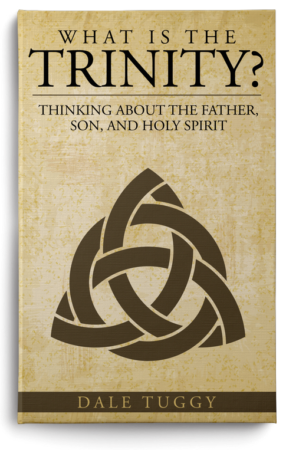 This post is occasioned by the following exchange between a couple of Facebook friends:
This post is occasioned by the following exchange between a couple of Facebook friends:
- Unitarian: “You said that Jesus existed ‘as God’. Did you mean ‘as God the Son’? I presume that by ‘God’ you actually mean the whole Trinity, and I cannot believe that you think that Jesus existed as a Trinity.”
- Trinitarian: “Stop. It. I’m not playing that ridiculous game for the hundredth time.”
The trinitarian goes on to scold the unitarian for playing verbal games, pointing out that for a trinitarian, “God” can refer to the Trinity, or to any of the three Persons. That is correct, and surely not something the unitarian would deny, but I think there’s more than a terminological problem here, and I don’t know that his interlocutor was playing any game. Let me explain.
My trinitarian friend, as a believer in the deity of Christ, you seem to be committed to:
1. Jesus = God
Why would someone think you’re committed to this? Because of the arguments you make for “the deity of Christ.” But that’s another post.
As a trinitarian, you believe:
2. God = Trinity
It is self-evident that = (numerical identity) is transitive. Thus, if Jesus = God, and God = Trinity, it follows that:
3. Jesus = Trinity.
Hence, someone may ask you if you believe that Jesus just is the Trinity. It is a fair question, given that you seem committed to both 1 and 2. Also, in some contexts Christians will use “Jesus” as the proper name of the Christian God, which for them just is the Trinity.
BUT of course, everyone knows that 3 “sounds wrong.” It’s not something a trinitarian is supposed to say. Yet, anyone committed to 1 and 2 is thereby committed to the truth of 3. What to do?
So long as your loyalty to the project of trinitarian theology remains intact, you are committed to 2.

The thing to do, as many trinitarians will tell you, is to deny 1. Jesus is not God in the sense of being numerically the same as God. If he were, then whatever is true of one would have to be true of the other. But all Christians know that they have differed.
Jesus, for any Trinity theory, should be identical with “God the Son,” not with the triune God.
What, then, of the slogan that “Jesus is God’? How should a trinitarian understand that, if it shouldn’t be understood as asserting their numerical identity?
Again, many trinitarians will say that the “is” in “Jesus is God” should be understood as an “is” of predication, of description. “Jesus is God” then, would mean that he is divine, a divine being.
But wait… the Trinity just is the one true God – that’s what it is for a theology to be trinitarian. To be numerically identical to the one God, that entails being divine, surely. So the Trinity is a divine being, and the Son (given that “Jesus is God”) is a divine being. But they’re plainly not the same being, as they differ: one is tripersonal, and the other is in some sense 1/3 of the Trinity.
Different divine beings? That’s the same as saying different gods.
 It’s not easy to square a trinitarian theology with the idea of monotheism; but you probably knew that already. This difficulty leaps right out of the Nicene creed, with its talk about “true God from true God” – that sounds like not only using “God” ambiguously, for two different beings (Son, Father) but also it sounds like belief in two beings, each of whom is “true God,” i.e. fully divine, a god. But parsing the Nicene creed is no easy task. (See my What is the Trinity? for more on that.)
It’s not easy to square a trinitarian theology with the idea of monotheism; but you probably knew that already. This difficulty leaps right out of the Nicene creed, with its talk about “true God from true God” – that sounds like not only using “God” ambiguously, for two different beings (Son, Father) but also it sounds like belief in two beings, each of whom is “true God,” i.e. fully divine, a god. But parsing the Nicene creed is no easy task. (See my What is the Trinity? for more on that.)
Anyway, my trinitarian friend, if you agree that our argument above is unsound because 1 is false, for the reasons given above, then you also agree that the first three steps of this argument are a sound argument. I encourage you, then, to engage further with that argument. Do you also accept 4, 6, and 8? If not, why not?